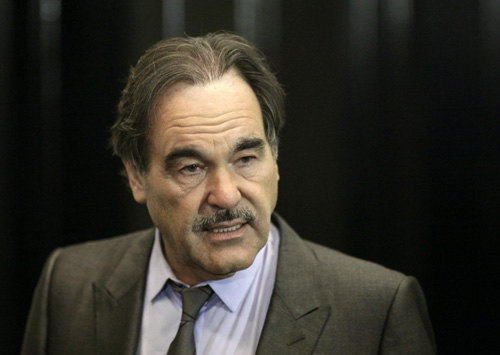


LOS ANGELES - The son of a stockbroker, director Oliver Stone returns to the scene of the financial crimes he first explored in his 1987 "Wall Street" with his new feature, "Wall Street: Money Never Sleeps."
Once again, Michael Douglas plays the iconic financier Gordon Gekko -- he won the best actor Oscar for his original performance -- as Gekko is released from jail into a new world of complex financial derivatives. The 20th Century Fox film opened September 24.
In a recent interview, Stone spoke about his decision to make a sequel, the ways Wall Street has become even more ruthless since the first film, and whether Gekko is a hero.
THR: What was your first reaction when Michael Douglas and producer Edward Pressman first proposed a sequel in 2006?
Oliver Stone: I was open to it. I didn't see the need for it. But they commissioned a script from Stephen Schiff. It had many good things in it, including the daughter of Gekko's character, Winnie. But at that time, it just seemed out of context, a celebration of wealth. So I passed on it. Then around early 2009, Ed and Michael reached out to me with a new script written by Allan Loeb, which was very interesting. It hooked me. It had more elements, but it was still around the hedge fund world. We did a lot of research, and we moved it to the banking world and changed quite a bit over the course of the next eight to nine months, during the shooting and during the editing. The script for me is an ongoing thing. Even after Cannes (where the film debuted in May), we were doing some changes.
THR: How deeply did you research the subject?
Stone: I read William Cohen's book on Bear Stearns, that was the first big book I read. But the Rolling Stone article that was so famous, by Matt Tai, that came out just as we were going to shoot, but I'd received something similar in terms of information from Eliot Spitzer, the ex-prosecuting attorney who took on a lot of the Wall Street cases, especially AIG. And he said to us, Take a strong look at what Goldman Sachs is doing here. He said Goldman is playing it both ways, they are going long and short. It's a very interesting concept for a script, because as we say in the movie, it was like a bookie who books bets going in and out. That was quite something. He said look at this nexus of Goldman/AIG as an evil empire.
THR: The first "Wall Street" dealt with insider trading, which was relatively easy to dramatize. The current financial system is so abstract. Did that present problems for you as a dramatist?
Stone: It's much more complex. Derivatives have blossomed into a new industry, way beyond the bond market. It's a huge thing. We certainly didn't push it, but we did cover it. It's talked about, but it doesn't have to be known by audience. It's in there, especially in the Federal Reserve Board meetings -- the concept of being too big to fail. What you get from the movie is that the banks are really running the show. They are counterparties to each other. In that Federal Reserve Board scene, you see right at the beginning that Frank Langella's bank is dependent on all the other banks. In a sense, inside information doesn't mean anything anymore, because they all know each other's business and trade with each other. With computers being so high-frequency in the trading, let's say you go to market with some inside information -- well, another computer can pick up that information and beat you out by seconds. It's what Goldman has been doing. They can beat you by a few seconds and make a few pennies on a trade, and they do so much volume, they will trade for a half-a-penny profit. That would have been inconceivable in the 1980s, or in my father's era before that.